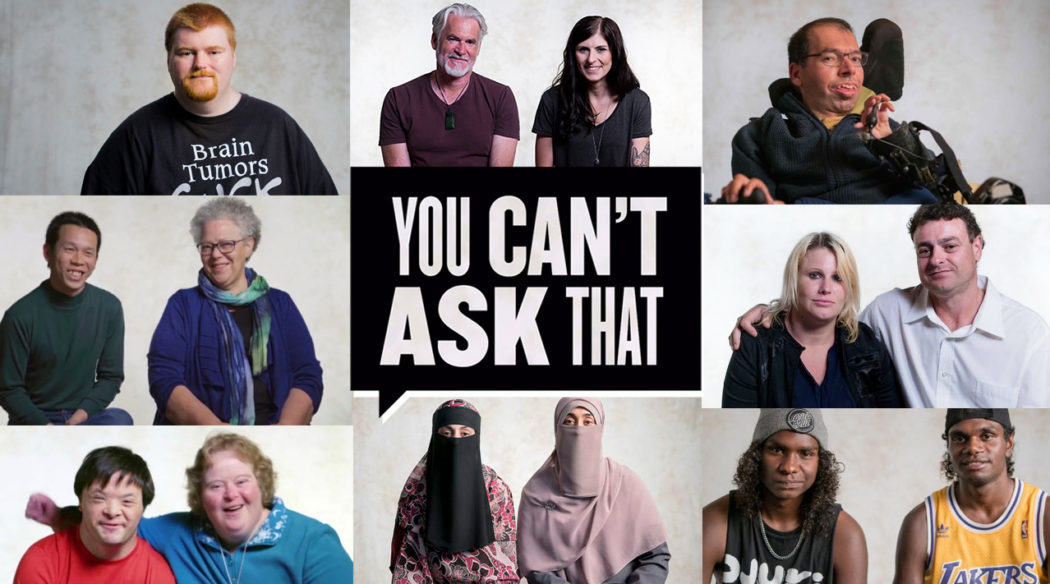You Can’t Ask That: The TV Show We All Need to Watch
Forgive me if I’m late to the party (the kids wouldn’t get off the bloody screens!) but I’ve recently discovered a wonderful and vitally important TV series on the ABC called You Can’t Ask That.
Now in Series 2, it began airing about nine months ago and features a very simple premise: ask a group of misjudged, marginalised or misunderstood people (survivors of suicide / Muslims / short-statured / terminally ill / homeless / blind / children of same-sex marriages / refugees) all the questions we’ve been told by society not to ask.
Have you been brought up gay? Don’t you think you were selfish and cowardly? Will you go back to your country when it’s safe again? How do you know you’re not dressed like an idiot?
Why do I believe it’s such an important show?
For generations, parents have been telling kids they can’t ask certain questions of certain people. I’m sure we’ve all done it, and I’m sure that our motives were pure. We didn’t want to be rude or intrude or make people feel uncomfortable. But this has resulted in a distortion of our knowledge.
We think we know the answers when we’ve been too afraid to ask the questions. Worse still, we’ve believed the answers that the media and politicians have given us when they haven’t bothered to ask the questions either. This has fed our fears and our hatred and distrust of people we simply haven’t taken the chance to get to know. And, whether intentionally or otherwise, we have been passing these prejudices onto our children.
People aren’t making an effort to inform themselves because they feel that the way the have been informed on a Current Affair is good enough, and it’s not.
A recent study conducted at the University of Toronto reported that our prejudices are formed much earlier than we had imagined. This is why we need to ask the questions we’ve been told not to ask, and why we need people who are as brave as the participants in the show to answer these questions honestly and openly. This is how we can help stop perpetuating the myths and misunderstandings that are driving our prejudices and fears.
Currently, our debate on euthanasia isn’t led by the ones it will impact most, the terminally ill. Instead it is driven by the media, politicians and sanctimonious religious groups. We’re told that the terminally ill aren’t the ones who should be making decisions on such a delicate subject, but when you watch the series you realise that they are in fact, the only ones who should be making decisions and commenting on such an important topic.
We don’t have open discussions on the role of Islam in Australia because it doesn’t fit the current preferred agenda of fear. No one tells us that there are mosques in Australia that are over 140 years old, or that the majority of Muslim women choose to wear headscarfs, or that most Australian Muslims abhor violence and terrorism.
Suicide is another topic we’re not particularly fond of talking about in Australia. We are flooded with TV commercials telling us we have to reduce the road toll and yet we don’t talk about the fact that eight Australians take their own lives every day – more than the number of people who die on our roads. We don’t talk about the fact that men are three times more likely than women to kill themselves. And we don’t usually ask the survivors why they tried to end it all and what can be done to fix what is more often than not a mental health issue.
Sadly, one of the reasons our suicide rate is so high is that we don’t talk about many of the topics covered in the show – the struggle and bullying faced by young transgender kids; the silent battle with depression; homelessness caused by family violence and mental illness and indeed the stigma of homelessness itself. Our treatment of refugees and of people who we view with distrust also contributes to this. We isolate ourselves and our children by discouraging conversation and then wonder why so many kids in need struggle to communicate with us in return.
We should be encouraging discussion and understanding, we should be encouraging our kids to be brave enough to keep asking all the questions that use to come so naturally to them. It’s this kind of curiosity that leads to our kids having greater empathy for those around them.
A word that comes up often in the series is “dignity”, and nowhere is this more evident than when we see how the participants relate to one another. For the most part the interviews are carried out with two strangers sitting beside each other and what we see is how supportive they are of one another and how open and understanding they are. When we shield ourselves from these marginalised people, we rob them of their dignity, which only serves to make matters worse.
In Australia, we use titles to separate the marginalised from society and we use our silence to keep them away from us. As parents, and as people, we need to start breaking down these barriers and help our children to teach us how to be more understanding. This begins when we all start asking the questions we’ve been told we can’t ask, the questions this excellent TV series has been brave enough to ask.
—
You Can’t Ask That screens on the ABC on Wednesdays at 9.01pm. You can also watch past episodes on ABC iView: http://iview.abc.net.au/programs/you-cant-ask-that/LE1617H003S00

